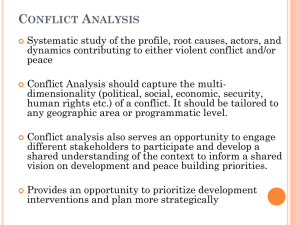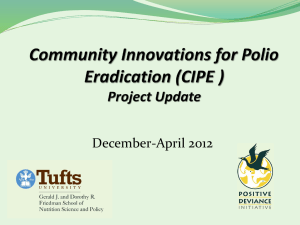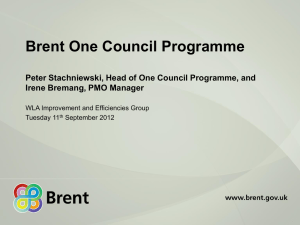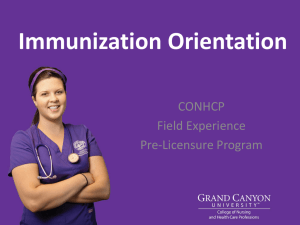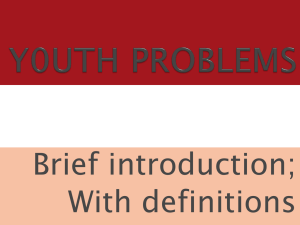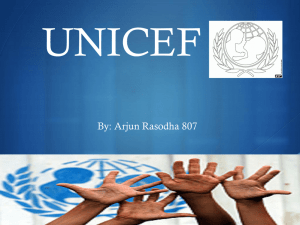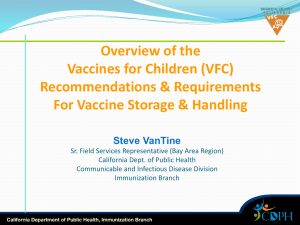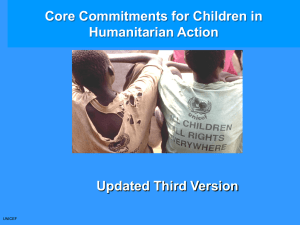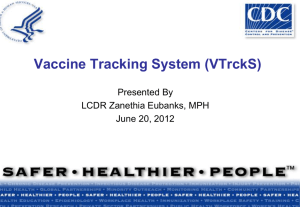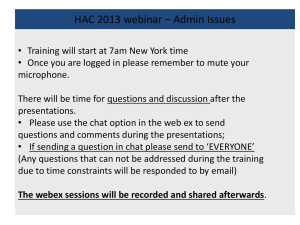CLICK AND TYPE TITLE HERE - Measles & Rubella Initiative
advertisement
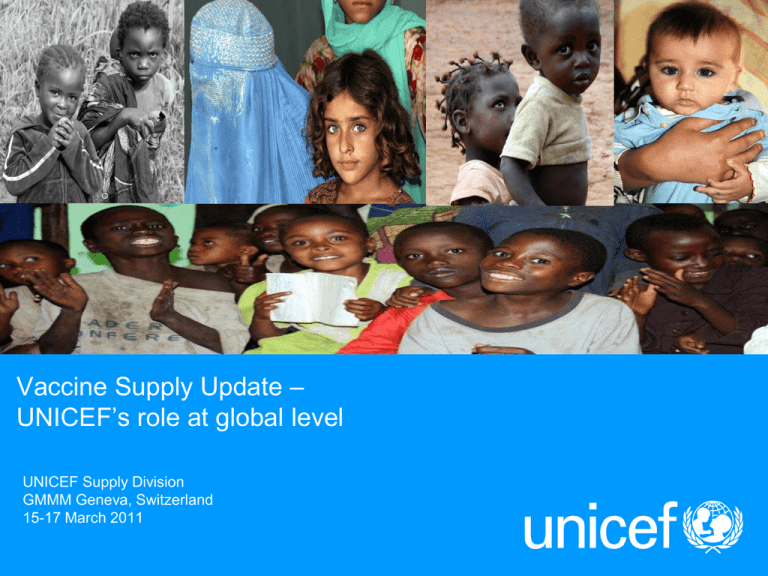
Vaccine Supply Update – UNICEF’s role at global level UNICEF Supply Division GMMM Geneva, Switzerland 15-17 March 2011 The procurement of vaccines and related supplies is UNICEF's largest procurement activity, conducted on behalf of 80 – 100 countries annually 2010: Immunization Supplies: US$ 750m 2.53 billion doses 1,769 shipments Immunization Supplies Vaccines BCG , DTP, TT/Td/DT, Measles containing, OPV, HepB, YF, DTP-HepB, DTPHepB/Hib, DTP/Hib, Hib, MR, Meningitis, MMR, IPV, Pneumo, etc. Safe Injection equipment Cold Chain Equipment Countries UNICEF procures on behalf of All Vaccines Part of the Vaccines Source: 2010 vaccine database, UNICEF UNICEF annual vaccine procurement has increased five fold since 2000 supporting UNICEF Programmes and on behalf of Partners, Global Programmes, Governments and NGO’s UNICEF SD Annual procurement value of vaccines, in million USD $900 $800 $700 $600 $500 $400 $300 $200 $100 1978 1979 1980 1981 1982 1983 1984 1985 1986 1987 1988 1989 1990 1991 1992 1993 1994 1995 1996 1997 1998 1999 2000 2001 2002 2003 2004 2005 2006 2007 2008 2009 2010 $0 The arrows indicate the main programme drivers for the increased procurement value. Source UNICEF Supply Division UNICEF vaccine procurement values on behalf of governments and partners are increasing $900,000,000 $800,000,000 $700,000,000 $600,000,000 GAVI 48% $500,000,000 $400,000,000 Procurement Services 33% $300,000,000 $200,000,000 UNICE F Programme 19% $100,000,000 $0 1997 1998 1999 2000 2001 2002 2003 2004 2005 2006 2007 2008 2009 2010 PROG PS GAVI falls under procurement services but is highlighted separately to show the overall portion of GAVI funded procurement Source UNICEF Supply Division Major vaccine group volumes by year (2005-2010), in doses Procurement Volume in dose OPV has been # 1 in terms of the procurement volume. 3,500,000,000 3,000,000,000 2,500,000,000 2,000,000,000 1,500,000,000 1,000,000,000 500,000,000 0 2005 BCG DTP-HepB/Hib 2006 2007 MEASLES Source: UNICEF Supply Division MENING 2008 OPV 2009 TT YF 2010 Others Procurement volume in 2010 • OPV: 1,885 million doses • Measles: 169 million doses • TT: 130 million doses • BCG: 106 million doses • DTP-HepB/Hib: 98 million doses • Yellow Fever: 35 million doses • Meningitis: 23 million doses UNICEF’s procurement strategies are focused on achieving Vaccine Security, acknowledging the different forces in the individual markets The Vaccine Procurement Principles, implemented following the supply crisis in the traditional vaccine markets, are valid for all vaccine markets to ensure a healthy market 1. 2. 3. 4. 5. 6. 7. A healthy industry is vital to ensure uninterrupted and sustainable supply of vaccines Procurement from multiple suppliers for each vaccine presentation Procurement from manufacturers in developing countries and industrialized countries Paying a price that is affordable to Governments and Donors and a price that reasonably covers manufacturers minimum requirements UNICEF should provide manufacturers with accurate and long-term forecasts; Manufactures should provide UNICEF with accurate and long-term production plans As a public buyer, providing grants to manufacturers is not the most effective method of obtaining capacity increases The option to quote tiered pricing should be given to manufacturers. Within Supply, UNICEF activities are focused on 2 core areas to enhance access and delivery Vaccine Industry Market Shaping: Market Shaping: Interacting with Industry; Establishing the required supply Agreements; Vaccine Security Supply Chain Performance Enhancement Supporting Local Delivery Countries Supporting Partners, Strategic Demand Forecasting & Financing for New Vaccine Introduction Market Shaping - Global Availability Supply Chain Performance Enhancement Market Shaping within a changing landscape Increasing complexity within procurement as new products become available Competition with Industrialised countries for production allocation Demand reacting to changes and developments in immunization programmes, vaccine development and Donor support Country preferences on presentation and formulation Requires balancing with financial sustainability Need for increased flexibility on tendering strategies, maintaining long time horizons and providing for market flexibility UNICEF Supply Division’s main roles in the immunization supply chain. Effective forecasting and planning requires supply and logistics be fully integrated into programme planning. Data Analysis Data analysis for effective supply Planning - Sharing Price information Vaccine/Device/ Cold chain Procurement DB from 1997 Monitoring & Reporting Annual Forecasting Management of the global forecasting Exercise -Forecast data from 2003 -Provisional Plan -Forecasting accuracy reports Immunisation Order Placement Supplier Operational Follow-ups Procurement & Technical guide Health Centre Contracts and suppliers management District/Regional Cold Chain Storage Airport Shipping management for on-time delivery Vaccine Arrival Report Central Cold Chain Storage Capacity building for in-country logistics Cold chain weight & volume calculator UNICEF procures Measles containing vaccines on behalf of 80-100 countries annually for Routine and Supplementary Immunization Activities 2009: 130,914,370 doses 2010: 173,632,162 doses Vaccines Measles-10, MR-10, MMR-1, MMR-5, MMR-10 Countries UNICEF procures on behalf of All Vaccines Part of the Vaccines Source: Allocation Table Data UNICEF Measles containing vaccine procurement through UNICEF largely driven by supplementary activities Measles containing vaccine procurement (2002-2010) and forecast (2011-2012), in doses 180,000,000 160,000,000 140,000,000 120,000,000 Measles Routine Measles Supplementary 100,000,000 MMR-1 Routine MMR-10 Routine MMR-10 Supplementary 80,000,000 MMR-5 Routine MR-10 Routine 60,000,000 MR-10 Supplementary 40,000,000 20,000,000 0 2002 2003 2004 2005 2006 2007 2008 2009 2010 2011 2012 Source: UNICEF SD Historical Procurement Database and 2011 Forecast Supplier Market and 2011 WAP prices Measles-10: 4 vaccines WHO pre-qualified: 0.24 $ per dose (70% of the vaccine is sourced from 1 supplier) MMR-1: 2 vaccines WHO pre-qualified: 1.85 $ per dose MMR-5: 1 vaccine WHO pre-qualified: 0.90 $ per dose MMR-10: 2 vaccines WHO pre-qualified: 1.183 $ per dose MR-10: 2 vaccines WHO pre-qualified: 0.534 $ per dose MEA-10 WAP per dose $0.3000 $0.2500 $0.2000 $0.1500 $0.1000 $0.0500 $0.0000 2004 2005 2006 2007 2008 2009 2010 2011 2012 Source: UNICEF Supply Division Some facts about vaccine supply Planning is Key: • • • • • • • • • Production of a dose: 6 -24 months Capacity Increase: 2-3 years New Plant: 5-7 years Lead time for supply 4-8 weeks + transit time New regulatory requirements can cause interruptions Approx. 65 countries require NRA registration UNICEF requests 20 months shelf life for measles vaccine Current awards (in doses) based on 2009 forecast Additional increases in quantities to meet updated demand are possible but require planning Year Vaccine Mea 10 MR 10 2010 2011 2012 Award Quantity Award Quantity Award Quantity 165,000,000 125,000,000 110,000,000 1,700,000 3,700,000 2,700,000 MMR 1 500,000 250,000 250,000 MMR 5 3,100,000 3,100,000 3,400,000 MMR 10 1,700,000 1,800,000 1,800,000 Source: UNICEF Supply Division Some facts about vaccine supply Planning is Key: • • • • • • • • • Production of a dose: 6 -24 months Capacity Increase: 2-3 years New Plant: 5-7 years Lead time for supply 4-8 weeks + transit time New regulatory requirements can cause interruptions Approx. 65 countries require NRA registration UNICEF requests 20 months shelf life for measles vaccine Current awards 2011-2012 (in doses) based on 2009 forecast Additional increases in quantities to meet updated demand are possible but require planning Year 2010 2011 2012 Vaccine Award Quantity Award Quantity Award Quantity Mea 10 165,000,000 125,000,000 110,000,000 MR 10 1,700,000 3,700,000 2,700,000 MMR 1 500,000 250,000 250,000 MMR 5 3,100,000 3,100,000 3,400,000 MMR 10 1,700,000 1,800,000 1,800,000 Source: UNICEF Supply Division Overview of AD-syringes procurement, 1997-2011* Current Long Term Arrangements for all devices are up for re-tendering in 2011 •Helsinki •Helsingborg •Barcelona •Shanghai Procuring immunization supplies from the following areas: •Dubai •Mumbai Manufacturers of AD syringes Manufacturers of Safety Boxes Sources: UNICEF SD Historical Devices Procurement Database, and September 2010 allocation tables Measles Campaigns are the Introduction Window for RUP syringes (5ml) UNICEF SD delivered RUP syringes for Measles campaigns in: Peru Nigeria Burkina Faso Chad Increased supplier base: There are at present 14 WHO PQS prequalified suppliers (compared to 6 prequalified in Dec 2007) Two types of RUP syringes available: • Regular RUP syringes • RUP syringes with Sharps Injury Prevention feature (SIP) protecting from needle stick injuries 16 Effective forecasting and planning requires supply and logistics be fully integrated into programme planning Consider the whole supply chain; it’s capacity and the context Evaluate the capacity to receive and deliver: • Cold Chain and Logistics Capacity • Parallel products – integrated campaigns • Routine and Campaign activities • Modes of shipment • Lead times Thank you! More information: http://www.unicef.org/supply/index_immunization.html

